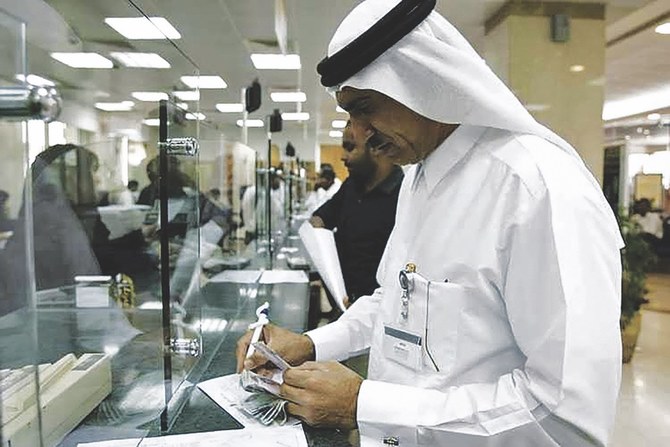DAVOS: The risk of catastrophic cyberattacks is soaring because of geopolitical instability, according to a report launched at the World Economic Forum’s annual meeting in Davos on Wednesday.
More than 93 percent of cybersecurity experts and 86 percent of business leaders, who were interviewed for the report, believe that “a far-reaching, catastrophic cyber event is likely in the next two years,” and that there is a critical skills gap threatening societies and key infrastructure.
The “Global Cybersecurity Outlook 2023” report is based on polls, workshops and interviews with more than 300 experts and senior executives. Half of the companies surveyed said the current landscape is making them reevaluate the countries in which they do business.
Despite challenges, organizations are improving cyber resilience, one of the key priorities of the WEF’s Centre for Cybersecurity.
The report said that awareness and preparation would help organizations balance the value of new technology against the cyber risk that comes with it.
It highlighted the need to address the shortage of talent and skilled experts. A significant 34 percent of cybersecurity experts said they lacked some skills in their team, while 14 percent said they lacked critical skills.
The problem is more pronounced in key sectors such as energy utilities, where nearly 25 percent of the cybersecurity experts surveyed said they lacked the necessary critical skills to protect their organizations’ operations.
Expanding the cybersecurity talent pool is needed to solve this problem, according to “Global Cybersecurity Outlook 2023,” which was written in collaboration with Accenture.
Several successful cybersecurity skills programs are underway around the world, but many have difficulty scaling to large numbers. Greater cross-industry collaboration and public-private partnerships are needed to overcome this challenge.
Geopolitics is reshaping the legal, regulatory and technological environment. “As global instability increases cyber risk, this report calls for a renewed focus on cooperation,” Jeremy Jurgens, managing director of the WEF, said.
“All stakeholders from public and private sectors who are responsible for our common digital infrastructure must work together to build security, resilience and trust.”
A WEF news release that accompanied the launch of “Global Cybersecurity Outlook 2023” highlighted the views of leading industry figures on a range of topics.
“The research shows that business leaders are now more aware of their organizations’ cyber risks. However, there is the need to go further to assessing and translating the business risk into actionable next steps across the entire organization,” Paolo Dal Cin, global lead of Accenture Security, said.
“Long-term cyber resilience requires a closely coordinated team effort across the C-suite to gain a clearer view of the cyber risks so security can be embedded in all strategic business priorities and protect the digital core. As our digitally connected world expands, now is the time to build cyber resilient businesses for customers, employees and supply chain partners.”
Commenting on the skills gap, Ken Xie, chairman of the board and CEO of Fortinet, said: “The threat landscape continues to expand and evolve with cyber adversaries targeting organizations of all sizes, locations and industries around the world.
“The disruption of operations or services and the compromise of data due to cyberattacks against the backdrop of a global skills gap places every individual, organization and even nation at risk. When we work together to encourage best practices we see greater progress in the fight against cybercrime.
“Shared data and trusted global partnerships can enable more effective responses and better predict future attack strategies to deter adversary efforts.”
Leaders are now more likely than one year ago to see data privacy laws and cybersecurity regulations as an effective tool for reducing cyber risks across a sector. But speed is clearly an issue.
On the question of regulation, Hoda Al-Khzaimi, director of the Center for Cybersecurity and founder and director of Emartsec at New York University, Abu Dhabi, said: “Standardization can take 18 months but a cyberattack takes seconds. The speed at which emerging technologies are implemented often outpaces our ability to build security measures around them. We need to go beyond simple compliance with regulations if organizations are to be cyber-resilient.”
Underscoring the importance of investing in cybersecurity, Nikesh Arora, CEO and chairman of Palo Alto Networks, said: “Cyberattackers don’t rest with macro-economic challenges, they double down on them. There is no path to success that is not heavily driven by AI and automation.
“As companies accelerate their digital transformation journeys, the time for reimagining and investing in cybersecurity architectures — intelligent platforms — is now. Boards and the C-suite must embrace a strategy whereby cybersecurity is deeply embedded across the enterprise from operations to innovation. Only then will organizations be able to create a state of resilience that enables, not inhibits, their strategic business outcomes.”
A lingering, vexing challenge is how to price cybersecurity, according to the “Global Cybersecurity Outlook 2023” report. It quoted one survey respondent as saying: “Board members are interested in risk, opportunities and investment in cost.
“We need to better respond to the question(s), What is the return? How do I know this is a good investment across the myriad of things that I could potentially be invested in? How can we improve at making effective metrics to help boards make better-informed decisions?”
Cybersecurity is also influencing strategic business decisions, with 50 percent of participants in the research saying that it was a consideration when they evaluated which countries in which to invest and do business.
Compared with last year, the report found that board-level executives are more likely to prioritize cyber risk and are more aware of their own role in addressing it. This has led to increased interaction with cybersecurity leaders, “cyber leaders, business leaders and boards of directors are now communicating more directly and more often.” The bad news is that they “continue to speak different languages.”
All too often, according to the report, when security and business leaders discuss cybersecurity, the rapidly evolving contours of cyber risks get lost in translation. Chief information security officers may fail to convey the complex data they have gathered — on risk points, threat actors, mapping of criminal campaigns — into an accessible story that results in specific mitigating actions in their organizations.
Instead, they need to tell stories that align with their corporate and business priorities. “Boards should be presented with a cyber posture that resonates with customers’ and authorities’ expectations and helps address sectorial ecosystem challenges,” said Christophe Blassiau, senior vice-president of cybersecurity and global chief information security officer at Schneider Electric.
Despite this challenge, “Global Cybersecurity Outlook 2023” reports that the disconnect between cybersecurity managers and business executives has begun to close. Both increasingly perceive the elevated degree of risk exposure and are allocating more resources to coordinate responses in an effective manner, it said, adding that the priority today is on speed.
















